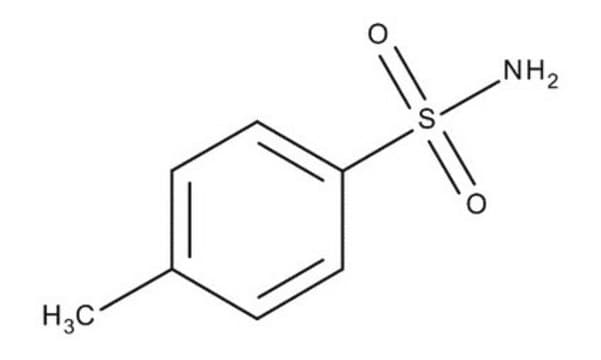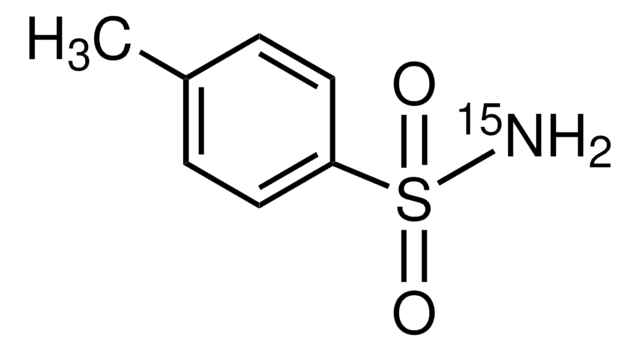257990
o-Toluenesulfonamide
99%
Synonyme(s) :
2-Methylbenzene-1-sulfonamide, 2-Methylbenzenesulfonamide, 2-Methylbenzenesulfonimidic acid, 2-Tolylsulfonamide, Toluene-2-sulfonamide, o-Methylbenzenesulfonamide, o-Toluenesulfamide
About This Item
Produits recommandés
Pureté
99%
Forme
powder
Pf
156-158 °C (lit.)
Chaîne SMILES
Cc1ccccc1S(N)(=O)=O
InChI
1S/C7H9NO2S/c1-6-4-2-3-5-7(6)11(8,9)10/h2-5H,1H3,(H2,8,9,10)
Clé InChI
YCMLQMDWSXFTIF-UHFFFAOYSA-N
Vous recherchez des produits similaires ? Visite Guide de comparaison des produits
Description générale
Application
- Dynamic ligand reactivity in a rhodium pincer complex.: Discusses the role of o-toluenesulfonamide as a ligand in advanced chemical syntheses, demonstrating its utility in creating reactive intermediates for catalytic processes (Tang et al., 2015).
- Reaction of arylium ions with the collision gas N2 in electrospray ionization mass spectrometry.: Highlights the use of o-toluenesulfonamide in mass spectrometry studies to understand ionization mechanisms, aiding in the identification of complex chemical structures (Liang et al., 2015).
- Benzosulfonamides in wastewater: method development, occurrence and removal efficiencies.: Focuses on the development of methods to detect and remove o-toluenesulfonamide from wastewater, emphasizing its prevalence and the challenges associated with its elimination (Ajibola et al., 2015).
Mention d'avertissement
Warning
Mentions de danger
Conseils de prudence
Classification des risques
Carc. 2 - Eye Irrit. 2
Code de la classe de stockage
11 - Combustible Solids
Classe de danger pour l'eau (WGK)
WGK 2
Point d'éclair (°F)
Not applicable
Point d'éclair (°C)
Not applicable
Équipement de protection individuelle
Eyeshields, Gloves, type P3 (EN 143) respirator cartridges
Certificats d'analyse (COA)
Recherchez un Certificats d'analyse (COA) en saisissant le numéro de lot du produit. Les numéros de lot figurent sur l'étiquette du produit après les mots "Lot" ou "Batch".
Déjà en possession de ce produit ?
Retrouvez la documentation relative aux produits que vous avez récemment achetés dans la Bibliothèque de documents.
Les clients ont également consulté
Notre équipe de scientifiques dispose d'une expérience dans tous les secteurs de la recherche, notamment en sciences de la vie, science des matériaux, synthèse chimique, chromatographie, analyse et dans de nombreux autres domaines..
Contacter notre Service technique





![1,8-Diazabicyclo[5.4.0]undéc-7-ène 98%](/deepweb/assets/sigmaaldrich/product/structures/120/564/5b373e23-1624-489c-8efb-692de0f96ffb/640/5b373e23-1624-489c-8efb-692de0f96ffb.png)







